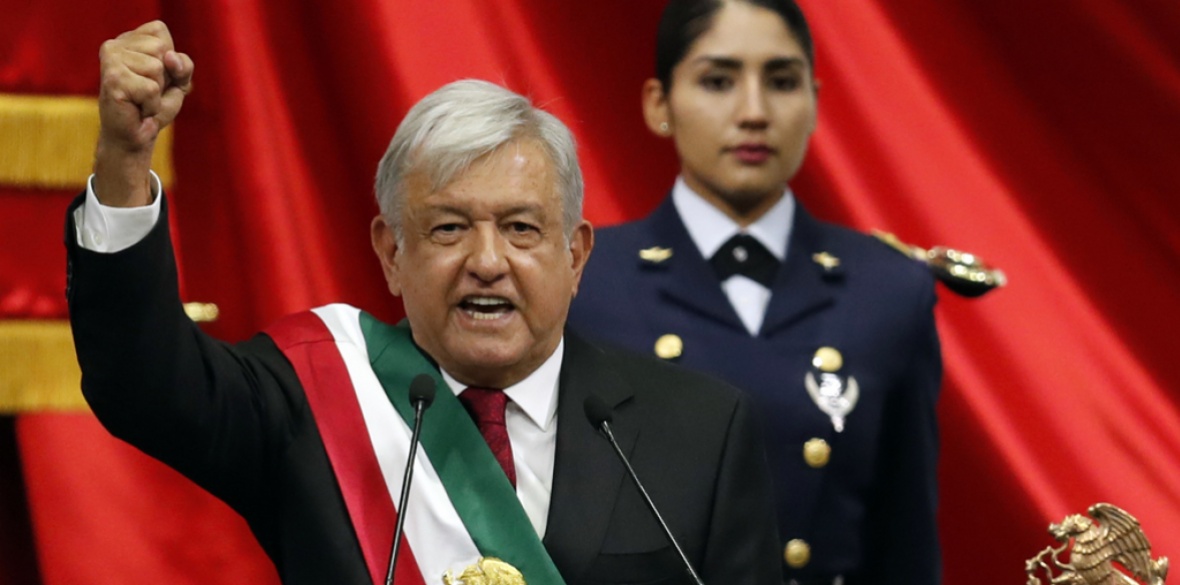This is the last article you can read this month
You can read more article this month
You can read more articles this month
Sorry your limit is up for this month
Reset on:
Please help support the Morning Star by subscribing here
IT’S NOT too much of an exaggeration to say that Mexico is a borderline failed state. Forced disappearances are common, as are arbitrary arrests, extrajudicial killings and torture at the hands of the cartels, the police and the military, all of which go virtually unpunished by the government.
Making matters worse is the fact that elections have traditionally been little more than a rubber stamp for the Institutional Revolutionary Party (PRI) to maintain its 71-year hold over the country. But now things are different.
On July 1, the leftist candidate Andres Manuel Lopez Obrador, or Amlo for short, and his Moreno party won the presidential election by a landslide. Today he becomes president.
“First, I think I’m going to cry,” Lupita Valdez of the Britain-based campaign group Justice Mexico Now tells me when I ask how she’ll feel watching Amlo’s inauguration.
“This day should have happened in 2006,” she says, referring to the election in which Amlo lost by 0.6 per cent in very dubious circumstances. “There has been so much suffering since then.
“There have been hundreds of thousands of forced disappearances, bodies buried in mass graves, mothers crying, yelling, fighting and killed looking for their children. Previous governments have either done nothing or they have caused more suffering.”
Homicides rose 16 per cent in the first half of this year, according to government statistics, breaking the country’s own records for violence. Over 130 politicians were assassinated during the presidential election and the official number of people forcibly disappeared stands at over 34,000.
Could it be the only way to save Mexico from the violence of the drug cartels, the oligarchy and its imperialist neighbour to the north is to arm the workers and stage a full-on socialist revolution?
Valdez is sceptical, believing it far too dangerous. Mexico’s main problem, she says, has been the lack of political will to stop the violence and deal with those responsible.
“There has been the political will to distribute wealth and power among a small group of already wealthy people but there has not been the political will to change things for the better, for the people.
“But Amlo has the political will not only to change the politics but also the culture of the country. He sees things from the people. In the ’80s he began a tour of the country. Every year, or every three years, he travels Mexico, city by city, village by village to meet people.
“There’s this app called something like the Gastronomic Amlo guide. It’s shows all of the places he has eaten throughout Mexico.
“He doesn’t go to the fancy places. He eats street food, you know, by the side of the road, in the corner where the old ladies cook. In Mexico the best food is the street food. But you don’t always know which ones are good. And so when he travels the country, people take him to eat at these places.
“He’s tried the best food in Mexico from Yucatan to Tijuana, Veracruz, Chihuahua, Zacatecas, everywhere. Imagine having toured Europe for 20 years eating with locals everywhere, every day. The app is just a bit of fun. It has pictures of him at these places, but actually, it depicts very clearly how he is a politician that knows the most about the people he is governing.
“He doesn’t like to be detached. He meets people and talks with and listens to them. And I mean, really talks with them, not like the politicians who talk at them.
The beauty of it all, Valdez believes, is that Mexico has someone in power now that will enable and work work grassroots movements across the country.
“People need to keep mobilising. It’s not like Amlo is there and he’s going to do everything. No, we need to keep doing what we did before. It’s just that, this time, we’re going to walk much faster and we won’t have the big truck of the PRI smashing into us.”
Even before his inauguration, Amlo has been changing the country, she says, by getting the people used to referendums and taking part in democracy.
“This is something that has never happened before. He’s training people little by little to engage in politics and that’s the first step.
“I think he’s going to bring about a cultural change. He’s going to give people the tools that they can use to change the country. Hopefully he will make changes to our education system and teach people about politics. It’s the complete opposite of fascism.”
People in Mexico and across Latin America are desperate for change, she says, and many left and left-leaning governments in South America have been too scared to bring this about.
“Take Michelle Bachelet in Chile for example. Yes, she was a centrist really, but she was kind of part of the pink tide. At the end of the day people in Chile were so disappointed that she did not bring about the changes people expected of her government.
“Unfortunately we have a wave of right-wing governments in Latin America now — Argentina, Brazil, Ecuador, Chile, Colombia.
“Amlo has a huge opportunity to prove that he can make those changes without being afraid of the oligarchy. It’s so important that Latin America sees that changes can be made and that you don’t have to be afraid of making them.
“Of course, the media is going to portray Amlo as this crazy leftist who’ll ruin the economy. But they forget Mexico is in a massive crisis. The most important thing is what he will do about the violence in the country because no-one was doing anything about it before.
“These supposedly amazing governments that sustained the economy did nothing about the bloodshed. By the way, Amlo did a great job as Mexico City mayor in terms of the economy.
“The business community in Mexico has somewhat accepted him already. He’s spoken with them. He’s been very friendly with them. And I think in general people in Mexico are not worried about the economy.
“What matters is what he does about the violence. The media focuses on the wrong part. While the oligarchy was making itself rich, it was losing control of huge parts of Mexico. You know hundreds of politicians were killed during the last election which highlights just how dangerous Mexico had become.”
As you read this during today’s Adelante festival, Valdez will be standing in Mexico City’s main square, the Zocalo, watching as a new era begins in her country. “I’m going to close my eyes,” she says, “and think of all of those people who should have been with us.
“And then I’m going to open my eyes and see Amlo. And then it’s just hope. Hope that in the future there won’t be as much violence.”
You can find our more about Justice Mexico Now on facebook.com/JusticeMexicoNow. Ben Cowles is web editor of the Morning Star. You can find him on twitter via @Cowlesz.

 Ben Cowles
Ben Cowles







